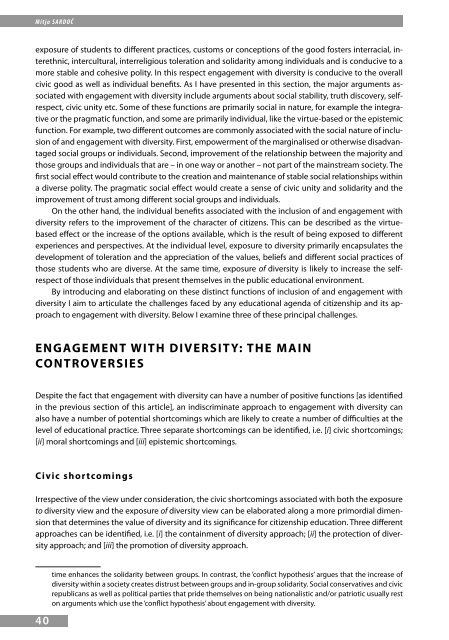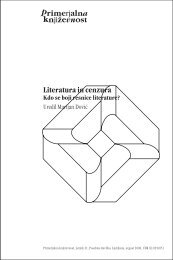Inštitut za slovensko izseljenstvo in migracije ZRC SAZU
Inštitut za slovensko izseljenstvo in migracije ZRC SAZU
Inštitut za slovensko izseljenstvo in migracije ZRC SAZU
- No tags were found...
Create successful ePaper yourself
Turn your PDF publications into a flip-book with our unique Google optimized e-Paper software.
Mitja SARDOČexposure of students to different practices, customs or conceptions of the good fosters <strong>in</strong>terracial, <strong>in</strong>terethnic,<strong>in</strong>tercultural, <strong>in</strong>terreligious toleration and solidarity among <strong>in</strong>dividuals and is conducive to amore stable and cohesive polity. In this respect engagement with diversity is conducive to the overallcivic good as well as <strong>in</strong>dividual benefits. As I have presented <strong>in</strong> this section, the major arguments associatedwith engagement with diversity <strong>in</strong>clude arguments about social stability, truth discovery, selfrespect,civic unity etc. Some of these functions are primarily social <strong>in</strong> nature, for example the <strong>in</strong>tegrativeor the pragmatic function, and some are primarily <strong>in</strong>dividual, like the virtue-based or the epistemicfunction. For example, two different outcomes are commonly associated with the social nature of <strong>in</strong>clusionof and engagement with diversity. First, empowerment of the marg<strong>in</strong>alised or otherwise disadvantagedsocial groups or <strong>in</strong>dividuals. Second, improvement of the relationship between the majority andthose groups and <strong>in</strong>dividuals that are – <strong>in</strong> one way or another – not part of the ma<strong>in</strong>stream society. Thefirst social effect would contribute to the creation and ma<strong>in</strong>tenance of stable social relationships with<strong>in</strong>a diverse polity. The pragmatic social effect would create a sense of civic unity and solidarity and theimprovement of trust among different social groups and <strong>in</strong>dividuals.On the other hand, the <strong>in</strong>dividual benefits associated with the <strong>in</strong>clusion of and engagement withdiversity refers to the improvement of the character of citizens. This can be described as the virtuebasedeffect or the <strong>in</strong>crease of the options available, which is the result of be<strong>in</strong>g exposed to differentexperiences and perspectives. At the <strong>in</strong>dividual level, exposure to diversity primarily encapsulates thedevelopment of toleration and the appreciation of the values, beliefs and different social practices ofthose students who are diverse. At the same time, exposure of diversity is likely to <strong>in</strong>crease the selfrespectof those <strong>in</strong>dividuals that present themselves <strong>in</strong> the public educational environment.By <strong>in</strong>troduc<strong>in</strong>g and elaborat<strong>in</strong>g on these dist<strong>in</strong>ct functions of <strong>in</strong>clusion of and engagement withdiversity I aim to articulate the challenges faced by any educational agenda of citizenship and its approachto engagement with diversity. Below I exam<strong>in</strong>e three of these pr<strong>in</strong>cipal challenges.ENGAGEMENT WITH DIVERSITY: THE MAINCONTROVERSIESDespite the fact that engagement with diversity can have a number of positive functions [as identified<strong>in</strong> the previous section of this article], an <strong>in</strong>discrim<strong>in</strong>ate approach to engagement with diversity canalso have a number of potential shortcom<strong>in</strong>gs which are likely to create a number of difficulties at thelevel of educational practice. Three separate shortcom<strong>in</strong>gs can be identified, i.e. [i] civic shortcom<strong>in</strong>gs;[ii] moral shortcom<strong>in</strong>gs and [iii] epistemic shortcom<strong>in</strong>gs.Civic shortcom<strong>in</strong>gsIrrespective of the view under consideration, the civic shortcom<strong>in</strong>gs associated with both the exposureto diversity view and the exposure of diversity view can be elaborated along a more primordial dimensionthat determ<strong>in</strong>es the value of diversity and its significance for citizenship education. Three differentapproaches can be identified, i.e. [i] the conta<strong>in</strong>ment of diversity approach; [ii] the protection of diversityapproach; and [iii] the promotion of diversity approach.40time enhances the solidarity between groups. In contrast, the ‘conflict hypothesis’ argues that the <strong>in</strong>crease ofdiversity with<strong>in</strong> a society creates distrust between groups and <strong>in</strong>-group solidarity. Social conservatives and civicrepublicans as well as political parties that pride themselves on be<strong>in</strong>g nationalistic and/or patriotic usually reston arguments which use the ‘conflict hypothesis’ about engagement with diversity.
















